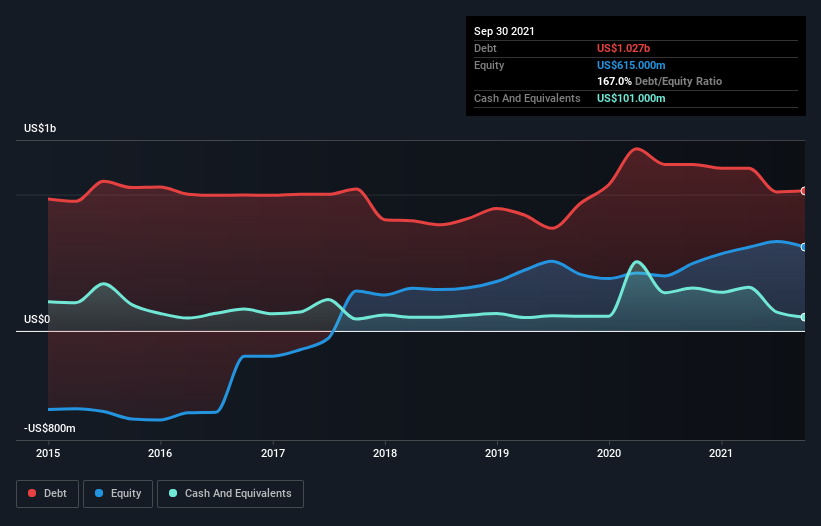Howard Marks put it nicely when he said that, rather than worrying about share price volatility, 'The possibility of permanent loss is the risk I worry about... and every practical investor I know worries about.' When we think about how risky a company is, we always like to look at its use of debt, since debt overload can lead to ruin. As with many other companies Meritor, Inc. (NYSE:MTOR) makes use of debt. But the more important question is: how much risk is that debt creating?
Why Does Debt Bring Risk?
Debt is a tool to help businesses grow, but if a business is incapable of paying off its lenders, then it exists at their mercy. Part and parcel of capitalism is the process of 'creative destruction' where failed businesses are mercilessly liquidated by their bankers. While that is not too common, we often do see indebted companies permanently diluting shareholders because lenders force them to raise capital at a distressed price. By replacing dilution, though, debt can be an extremely good tool for businesses that need capital to invest in growth at high rates of return. When we examine debt levels, we first consider both cash and debt levels, together.
Check out our latest analysis for Meritor
How Much Debt Does Meritor Carry?
As you can see below, Meritor had US$1.03b of debt at September 2021, down from US$1.22b a year prior. However, it does have US$101.0m in cash offsetting this, leading to net debt of about US$926.0m.

A Look At Meritor's Liabilities
According to the last reported balance sheet, Meritor had liabilities of US$900.0m due within 12 months, and liabilities of US$1.42b due beyond 12 months. On the other hand, it had cash of US$101.0m and US$534.0m worth of receivables due within a year. So its liabilities total US$1.69b more than the combination of its cash and short-term receivables.
This is a mountain of leverage relative to its market capitalization of US$1.72b. Should its lenders demand that it shore up the balance sheet, shareholders would likely face severe dilution.
In order to size up a company's debt relative to its earnings, we calculate its net debt divided by its earnings before interest, tax, depreciation, and amortization (EBITDA) and its earnings before interest and tax (EBIT) divided by its interest expense (its interest cover). This way, we consider both the absolute quantum of the debt, as well as the interest rates paid on it.
Meritor has a debt to EBITDA ratio of 2.9 and its EBIT covered its interest expense 2.8 times. This suggests that while the debt levels are significant, we'd stop short of calling them problematic. The good news is that Meritor grew its EBIT a smooth 100% over the last twelve months. Like a mother's loving embrace of a newborn that sort of growth builds resilience, putting the company in a stronger position to manage its debt. The balance sheet is clearly the area to focus on when you are analysing debt. But it is future earnings, more than anything, that will determine Meritor's ability to maintain a healthy balance sheet going forward. So if you want to see what the professionals think, you might find this free report on analyst profit forecasts to be interesting.
Finally, while the tax-man may adore accounting profits, lenders only accept cold hard cash. So we always check how much of that EBIT is translated into free cash flow. During the last three years, Meritor produced sturdy free cash flow equating to 63% of its EBIT, about what we'd expect. This free cash flow puts the company in a good position to pay down debt, when appropriate.
Our View
When it comes to the balance sheet, the standout positive for Meritor was the fact that it seems able to grow its EBIT confidently. But the other factors we noted above weren't so encouraging. In particular, interest cover gives us cold feet. When we consider all the factors mentioned above, we do feel a bit cautious about Meritor's use of debt. While we appreciate debt can enhance returns on equity, we'd suggest that shareholders keep close watch on its debt levels, lest they increase. The balance sheet is clearly the area to focus on when you are analysing debt. However, not all investment risk resides within the balance sheet - far from it. We've identified 2 warning signs with Meritor (at least 1 which is potentially serious) , and understanding them should be part of your investment process.
When all is said and done, sometimes its easier to focus on companies that don't even need debt. Readers can access a list of growth stocks with zero net debt 100% free, right now.
New: Manage All Your Stock Portfolios in One Place
We've created the ultimate portfolio companion for stock investors, and it's free.
• Connect an unlimited number of Portfolios and see your total in one currency
• Be alerted to new Warning Signs or Risks via email or mobile
• Track the Fair Value of your stocks
Have feedback on this article? Concerned about the content? Get in touch with us directly. Alternatively, email editorial-team (at) simplywallst.com.
This article by Simply Wall St is general in nature. We provide commentary based on historical data and analyst forecasts only using an unbiased methodology and our articles are not intended to be financial advice. It does not constitute a recommendation to buy or sell any stock, and does not take account of your objectives, or your financial situation. We aim to bring you long-term focused analysis driven by fundamental data. Note that our analysis may not factor in the latest price-sensitive company announcements or qualitative material. Simply Wall St has no position in any stocks mentioned.
About NYSE:MTOR
Meritor
Meritor, Inc. designs, develops, manufactures, markets, distributes, sells, services, and supports integrated systems, modules, and components in North America, South America, Europe, and the Asia Pacific.
Undervalued with proven track record.
Similar Companies
Market Insights
Community Narratives



